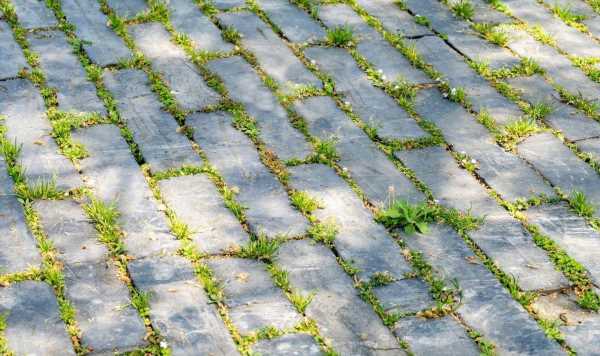Envirobond: How to remove weeds from your Paving stone joints
We use your sign-up to provide content in ways you’ve consented to and to improve our understanding of you. This may include adverts from us and 3rd parties based on our understanding. You can unsubscribe at any time. More info
Weeds are a nuisance as they will grow anywhere there is space, meaning they can pop up on the grass, in flower beds or on patios and driveways. When the cold season arrives, killing weeds in the freezing weather is the last thing you want to do, but it doesn’t have to be difficult. Whilst an easy option is to use a chemical weed killer, this can be unsafe and expensive. Instead a gardener has shared an organic recipe to “eradicate” them completely from gardens.
Gardening enthusiasts on Mrs Hinch Gardening Tips Facebook page had left many posts asking how to get rid of weeds naturally and one gardener shared his “recipe” for an “organically made weed killer”.
Stuart Egerton said: “Recently there have been a lot of posts on how to eradicate garden weeds. I’ve been asked to post my recipe for this organically made weed killer.”
“Take one cup of table salt and dissolve this in boiling water from a kettle or pan stirred until salt dissolves.
“Once the salt solution has cooled add this to one bottle of distilled white vinegar or apple cider vinegar.


“Add the juice of five lemons to the other ingredients and dilute in one gallon of water and stir. Now we need a carrier to coat weed leaves and stems. Washing up liquid is perfect.
“You now have a perfect natural weed eradicating solution that does what any chemical weedkiller will do.
“This solution kills all annual and perennial weeds and some unwanted plants like ivy. I use a spray bottle with a turntable nozzle for long spray or misting.”
The gardener noted that if people are worried about using it near their precious plants, cover them with a bin bag and tie in around the plant stem which in turn protects the plant from over spray.
DON’T MISS
Eliminate yellow stains from toilet seats with ‘magic’ household item [TIPS]
I removed stubborn stains from my hob using £1 spray without scrubbing [COMMENT]
Four ‘top kitchen updates’ to ‘hasten’ house sales – and what to avoid [EXPERT]
Stuart added: “Any weed eradication is better done in the early morning when the wind is at its lowest. This gives weeds a chance to absorb the solution through leaves and stems also taking it to their roots.
“The solution is safe around pets and children but shouldn’t be used on or near lawns otherwise it will kill the grass.”
When asked about how much boiling water to add, the gardener said: “Just enough boiling water to dissolve the salt, plus I usually just give a good squirt of washing up liquid.
“The washing up liquid is the carrier for the other ingredients to stitch to the weeds. It works very well but may take a few days. Although, I did my block paving yesterday and can see some weed leaves going crispy already.”

In the comments section Stuart added how much salt and vinegar to add in the recipe. He said: “150g of salt to 175ml of distilled white vinegar or apple cider vinegar.
“Depending on the weeds you want to eradicate, you can up the amounts to 200ml of vinegar. Please make sure to dissolve the table salt in boiling water first.”
Fellow gardening enthusiasts in the comments section loved this method for killing weeds. Jo Buddy said: “Thank you so much for sharing this. As a dog owner this is a perfect solution.”
Max Jones wrote: “Organic solution is so good.” Beth Haydock added: “This is my go-to method for killing weeds as it works so well.”

According to the experts at The Grass People, applying white vinegar between pavement cracks is an “ideal way to kill unsightly plants”.
Mixing white vinegar with washing up liquid also makes for a very potent and “effective” weed-killing solution.
The experts explained: “The acetic acid in vinegar sucks out the water from the weed, which dries it up, while the dish soap breaks down the outside of the plant, helping the vinegar to penetrate it quicker.
“However, as with all DIY weed removal methods, this should never be used on your grass or lawn or other organic matter as it could turn yellow and die off.”
Source: Read Full Article
